Fleurs du Mal Magazine


Or see the index
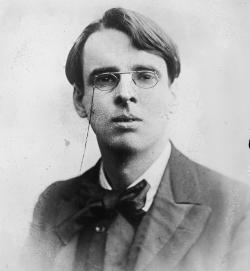
Never give all the Heart
Never give all the heart, for love
Will hardly seem worth thinking of
To passionate women if it seem
Certain, and they never dream
That it fades out from kiss to kiss;
For everything that’s lovely is
But a brief, dreamy, kind delight.
O never give the heart outright,
For they, for all smooth lips can say,
Have given their hearts up to the play.
And who could play it well enough
If deaf and dumb and blind with love?
He that made this knows all the cost,
For he gave all his heart and lost.
William Butler Yeats
(1865-1939)
Never give all the Heart
• fleursdumal.nl magazine
More in: Archive Y-Z, Archive Y-Z, Yeats, William Butler
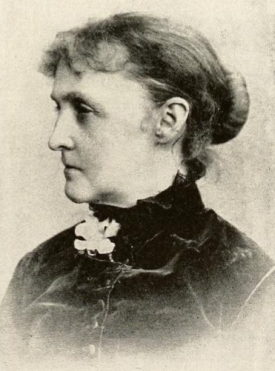
Hearing the Battle
July 21, 1861
One day in the dreamy summer,
On the Sabbath hills, from afar
We heard the solemn echoes
Of the first fierce words of war.
Ah, tell me, thou veilèd Watcher
Of the storm and the calm to come,
How long by the sun or shadow
Till these noises again are dumb.
And soon in a hush and glimmer
We thought of the dark, strange fight,
Whose close in a ghastly quiet
Lay dim in the beautiful night.
Then we talk’d of coldness and pallor,
And of things with blinded eyes
That stared at the golden stillness
Of the moon in those lighted skies;
And of souls, at morning wrestling
In the dust with passion and moan,
So far away at evening
In the silence of worlds unknown.
But a delicate wind beside us
Was rustling the dusky hours,
As it gather’d the dewy odors
Of the snowy jessamine-flowers.
And I gave you a spray of the blossoms,
And said: “I shall never know
How the hearts in the land are breaking,
My dearest, unless you go.”
Sarah Morgan Bryan Piatt
(1836–1919)
Hearing the Battle.
(July 21, 1861)
Poem
• fleursdumal.nl magazine
More in: # Classic Poetry Archive, #Editors Choice Archiv, *War Poetry Archive, Archive O-P, Archive O-P, WAR & PEACE
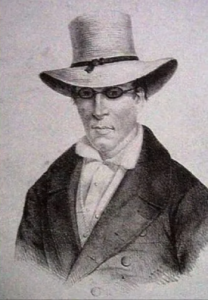
Le Mutilé
Vingt ans et mutilé !… voilà quelle est ma part;
Vingt ans… c’est l’âge où Dieu nous fait un cœur de flamme;
C’est l’âge où notre ciel s’embellit d’un regard,
L’âge où mourir n’est rien pour un baiser de femme.
Et le sort m’a tout pris !… excepté mon cœur!
Mon cœur… à quoi sert-il ? ironique faveur!
C’est le feu qui révèle au nautonier qui sombre,
Le gouffre inévitable au sein de la nuit sombre;
C’est la froide raison rendue à l’insensé:
Heureux s’il n’eût jamais pensé!
Mais ton amour est là, mon ange tutélaire,
Et mon cœur souffre moins, lorsque je dis: ma mère!
A ce large festin des élus d’ici-bas,
Qui me dira pourquoi je ne suis qu’un Lazare!
La vie est une fête où je ne m’assieds pas,
Et pourtant j’ai rêvé sa joyeuse fanfare!
La douleur m’a fait boire à sa coupe de fer;
Jeune vieillard, j’ai bu tout ce qu’elle a d’amer.
O vous qui demandez si l’âme est immortelle,
Et ma part de bonheur,… dites!… où donc est-elle?
Quoi ! Dieu nous mentirait, quand sa sainte équité
Nous promet l’immortalité!
Mais ton amour est là, mon ange tutélaire,
Et je ne puis douter, lorsque je dis: ma mère!
Toute existence ici s’échange par moitié,
Chaque âme peut trouver cette âme de son rêve;
Moi, quand je crie : Amour, l’écho répond : Pitié !…
Et ce mot dans mon cœur s’enfonce comme un glaive
Quelle bouche de femme éteindra dans mon sein
Cette soif d’être aimé qui me brûle sans fin?
Vivre seul dans la vie… Oh ! ce penser me tue!
Vivre seul… quand mon cœur est si riche d’amour.
Il vibre comme un glas dans mon âme abattue;
C’est à ne plus aimer le jour!
Mais ton amour est là, mon ange tutélaire,
Et je veux vivre encor, lorsque je dis: ma mère!
Souvent, le front ridé de mes sombres ennuis,
J’ai voulu, dans la foule, être oublieux et vivre;
J’ai voulu respirer, au sein des folles nuits,
Ces voluptés de bal dont le prestige enivre;
Imprudent que j’étais!… j’ai maudit leurs plaisirs!
Car je voyais glisser, dans leur valse en délire,
Ces vierges que le ciel enfanta d’un sourire;
Je les voyais; et nulle, en passant près de moi,
Ne disait d’un regard : à toi!
Mais ton amour est là, mon ange tutélaire,
Et je ne maudis plus, lorsque je dis: ma mère
Oh ! vous ne savez pas, vous qui vivez heureux,
Ce qu’un long désespoir peut jeter dans la vie!
Vous n’avez point senti ce moxa douloureux
Qui torture le cœur et qu’on nomme l’envie!
Quand un rêve d’amour vous suit au bal bruyant,
L’espérance du moins s’y montre en souriant;
Mais moi, lorsque le bal a fini ses quadrilles,
Ai-je une fiancée, entre ces jeunes filles,
A qui je puisse dire en lui serrant la main:
Dieu m’a fait un bien doux destin!
Mais ton amour est là, mon ange tutélaire,
Et puis-je être envieux, lorsque je dis : ma mère!
Ah ! lorsque vers la tombe inclinera mon front,
Je n’aurai pas une âme à qui léguer mon âme;
Arrivé seul au port où m’attend l’abandon,
Sans sourire, sans pleurs, je quitterai la rame.
Aucun enfant au seuil de mes jours éternels
Ne viendra recevoir mes adieux paternels!
Autour de mon chevet, à l’heure d’agonie,
Mes regards vainement chercheront une amie!
Et de moi, sur ce globe où je vins pour souffrir,
Plus rien… pas même un souvenir!
Mais ton amour est là, mon ange tutélaire,
Et si tu me survis, tu pleureras…. ma mère!
Eugène Dayot
(1810-1852)
Le Mutilé
• fleursdumal.nl magazine
More in: Archive C-D, Archive C-D, Dayot, Eugène, Leprosy

An Irish Airman foresees his Death
I know that I shall meet my fate
Somewhere among the clouds above;
Those that I fight I do not hate,
Those that I guard I do not love;
My country is Kiltartan Cross,
My countrymen Kiltartan’s poor,
No likely end could bring them loss
Or leave them happier than before.
Nor law, nor duty bade me fight,
Nor public men, nor cheering crowds,
A lonely impulse of delight
Drove to this tumult in the clouds;
I balanced all, brought all to mind,
The years to come seemed waste of breath,
A waste of breath the years behind
In balance with this life, this death.
William Butler Yeats
(1865-1939)
An Irish Airman foresees his Death
Photo: Alice Boughton, 1903
• fleursdumal.nl magazine
More in: Archive Y-Z, Archive Y-Z, Yeats, William Butler
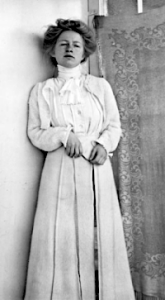
En önskan
Av hela vår soliga värld
önskar jag blott en trädgårdssoffa
där en katt solar sig…
Där skulle jag sitta
med ett brev i barmen,
ett enda litet brev.
Så ser min dröm ut…
Edith Södergran
(1892-1923)
En önskan
• fleursdumal.nl magazine
More in: Archive S-T, Archive S-T, Södergran, Edith
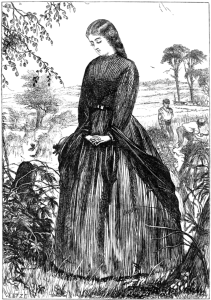
“Alone—together”
I
Alone, I see the sunrise, from the rocks above the sea;
And the hamlet flushed with rosy light, seems fairy-land to me:
There dwells the pilot’s daughter, whose dear love I’d die to win;
And the blue sky fills my heart with hope, while the merry tide flows in.
II
’Tis noon—we stand together, on the sands beside the sea;
And the maiden, folded to my heart, is sworn my bride to be!
In the sunshine flash the sea-gulls, skimming waves of rippled light;
The fisher boats ride gaily, under cliffs of dazzling white.
III
Alone, I see the sunset, from the churchyard near the sea,
For the cruel grave-stone at my feet, hides my darling’s face from me!
Like some dark pall, the sea-weeds droop from ledges cold and grey;
The night-mists shroud the hamlet, and the tide ebbs fast away!
Evelyn Forest
(Pen name of Anne Pares)
(? – ?)
“Alone—together”
Illustration: Frederick Eltze (1836–1870)
• fleursdumal.nl magazine
More in: # Classic Poetry Archive, Archive E-F, Archive E-F, Archive O-P, Archive O-P
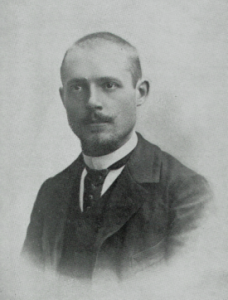
Paradis est plus fleuri que printemps.
Paradis est plus moissonneux qu’été.
Paradis est plus vendangeux qu’automne.
Paradis est si éternel qu’hiver.
Paradis est plus soleilleux que jour.
Paradis est plus étoilé que nuit.
Paradis est plus ferme que le ferme décembre.
Paradis est plus doux que le doux mois de mai.
Paradis est plus secret que jardin fermé.
Paradis est plus ouvert que champ de bataille.
Paradis est plus vieux que saint Jérôme.
Paradis est le céleste pourpris.
Paradis est plus capital que Rome.
Paradis est plus peuplé que Paris.
Paradis est désert plus que plaine en décembre.
Paradis est public et qui veut vient y boire.
Paradis est plus frais que l’aube fraîche.
Paradis est plus ardent que midi.
Paradis est plus calme que le soir.
Paradis est si éternel que Dieu.
Paradis est sanglant plus que champ de bataille.
Paradis est sanglant du sang de Jésus-Christ.
Paradis est royaume des royaumes.
Paradis est le dernier reposoir.
Paradis est le siège de Justice.
Paradis est le royaume de Gloire.
Paradis est plus beau qu’un jardin de pommiers.
Paradis est plus floconneux qu’hiver.
Paradis est plus sévère que mars.
Paradis est plus boutonneux qu’avril.
Paradis est plus bourgeonneux qu’avril.
Paradis est plus cotonneux qu’avril.
Paradis est plus embaumé que mai.
Paradis est plus accueillant qu’auberge.
Paradis est plus fermé que prison.
Paradis est demeure de la Vierge.
Paradis est la dernière maison.
Paradis est le Trône de Justice.
Veuille seulement Dieu que route y aboutisse.
Route que cheminons depuis dix-huit cents ans.
Paradis est auberge à la très belle enseigne.
Car c’est l’enseigne-ci : à la Croix de Jésus.
Cette enseigne éternelle est pendue à la porte.
Charles Péguy
(1873 - 1914)
Le Mystère des Saints-Innocents
(1912)
• fleursdumal.nl magazine
More in: # Classic Poetry Archive, Archive O-P, Archive O-P, Peguy, Charles, WAR & PEACE

The Lake Isle of Innisfree
I will arise and go now, and go to Innisfree,
And a small cabin build there, of clay and wattles made;
Nine bean-rows will I have there, a hive for the honey-bee,
And live alone in the bee-loud glade.
And I shall have some peace there, for peace comes dropping slow,
Dropping from the veils of the morning to where the cricket sings;
There midnight’s all a glimmer, and noon a purple glow,
And evening full of the linnet’s wings.
I will arise and go now, for always night and day
I hear lake water lapping with low sounds by the shore;
While I stand on the roadway, or on the pavements grey,
I hear it in the deep heart’s core.
William Butler Yeats
(1865-1939)
The Lake Isle of Innisfree
Photo: Alice Boughton, 1903
• fleursdumal.nl magazine
More in: Archive Y-Z, Archive Y-Z, Yeats, William Butler
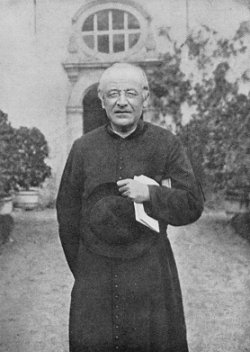
O! ‘t ruisen van het ranke riet
O! ‘t ruisen van het ranke riet!
o wist ik toch uw droevig lied!
wanneer de wind voorbij u voert
en buigend uwe halmen roert,
gij buigt, ootmoedig nijgend, neer,
staat op en buigt ootmoedig weer,
en zingt al buigen ‘t droevig lied,
dat ik beminne, o ranke riet!
O! ‘t ruisen van het ranke riet!
hoe dikwijls zat ik niet
nabij den stillen waterboord,
alleen en van geen mens gestoord,
en lonkte ‘t rimpelend water na,
en sloeg uw zwakke stafjes ga,
en luisterde op het lieve lied,
dat gijmij zongt, o ruisend riet!
O! ‘t ruisen van het ranke riet!
hoe menig mens aanschouwt u niet
en hoort uw’ zingend’ harmonij,
doch luistert nit en gaat voorbij!
voorbij alwaar hem ‘t herte jaagt,
voorbij waar klinkend goud hem plaagt;
maar uw geluid verstaat hij niet,
o mijn beminde ruisend riet!
Nochtans, o ruisend ranke riet,
uw stem is zo verachtelijk niet!
God schiep den stroom, God schiep uw stam,
God zeide: “Waait!…” en ‘t windtje kwam,
en ‘t windje woei, e, wabberde om
uw stam, die op en neder klom!
God luisterde… en uw droevig lied
behaagde God, o ruisend riet!
O neen toch, ranke ruisend riet,
mijn ziel misacht uw tale niet;
mijn ziel, die van den zelven God
‘t gevoel ontving, op zijn gebod,
‘t gevoel, dat uw geruis verstaat,
wanneer gij op en neder gaat:
o neen, o neen toch, ranke riet,
mijn ziel misacht uw tale niet!
O! ‘t ruisen van het ranke riet
weergalleme in mijn droevig lied,
en klagend kome ‘t voor uw voet,
Gij, die ons beiden leven doet!
o Gij, die zelf de kranke taal
bemint van enen rieten staal,
verwerp toch ook mijn klachte niet:
ik! arme, kranke, klagend riet!
Guido Gezelle
(1830 – 1899)
O! ‘t ruisen van het ranke riet
Uit: Vlaemsche dichtoefeningen 1857
• fleursdumal.nl magazine
More in: Archive G-H, Archive G-H, Gezelle, Guido, Guido Gezelle
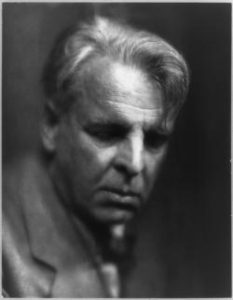
A Drinking Song
Wine comes in at the mouth
And love comes in at the eye;
That’s all we shall know for truth
Before we grow old and die.
I lift the glass to my mouth,
I look at you, and I sigh.
William Butler Yeats
(1865-1939)
A Drinking Song
• fleursdumal.nl magazine
More in: Archive Y-Z, Archive Y-Z, Yeats, William Butler
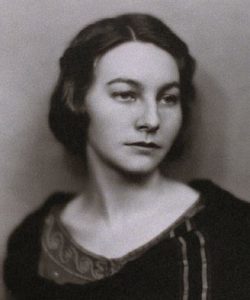
With Child
Now I am slow and placid, fond of sun,
Like a sleek beast, or a worn one:
No slim and languid girl—not glad
With the windy trip I once had,
But velvet-footed, musing of my own,
Torpid, mellow, stupid as a stone.
You cleft me with your beauty’s pulse, and now
Your pulse has taken body. Care not how
The old grace goes, how heavy I am grown,
Big with this loneliness, how you alone
Ponder our love. Touch my feet and feel
How earth tingles, teeming at my heel!
Earth’s urge, not mine,—my little death, not hers;
And the pure beauty yearns and stirs.
It does not heed our ecstacies, it turns
With secrets of its own, its own concerns,
Toward a windy world of its own, toward stark
And solitary places. In the dark,
Defiant even now, it tugs and moans
To be untangled from these mother’s bones.
Genevieve Taggard
(1894 – 1948)
With Child
• fleursdumal.nl magazine
More in: # Classic Poetry Archive, Archive S-T, Archive S-T

The Seasons
Spring—and her heart is singing
A song full of joyous cheer;
For each brightening day seems bringing
The hope of her life more near.
Summer—her heart is waiting;
Its dream is yet unfulfilled:
But her trust knows no abating,
Though the Spring’s glad song is stilled.
Autumn—her heart is burning
With the fever of restless fears;
And the darkened days returning
Bring her no relief save tears.
Winter—her heart is broken:
The struggles of Hope are o’er;
But the love that was here unspoken
Will be hers where hearts bleed no more.
Evelyn Forest
(Pen name of Anne Pares)
(? – ?)
The Seasons (1862-63)
Illustration: Frederick Eltze (1836–1870)
• fleursdumal.nl magazine
More in: # Classic Poetry Archive, Archive E-F, Archive E-F, Archive O-P, Archive O-P, Natural history
Thank you for reading Fleurs du Mal - magazine for art & literature